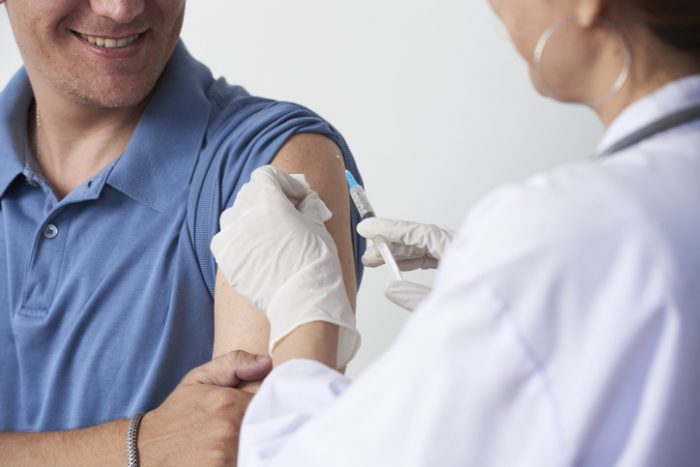
In August 2019, the CDC released new guidelines for the HPV vaccine. After conferring with the Advisory Committee on Immunization Practices (ACIP), the CDC determined the new guidelines for the HPV vaccine would include the following: (1)
- Both men and women up to age 26 should receive a catch up of the HPV vaccine if they have not received their full dosing prior.
- There should be shared clinical decision making for men and women aged 27-45 who have not received their full dosing of the HPV vaccine.
Curious about how these guidelines affect you? Read on to learn more about what these changes mean.
What Did the New Guidelines Change?
- Catch-Up Vaccine Change: Previously, a catch-up HPV vaccine was only recommended to women through age 26 and to men through age 21. Now the recommended age has been extended to allow a catchup vaccine for both men and women until age 26.
- Shared Clinical Decision Making: In October 2018, the FDA announced that the HPV vaccine had been approved for ages 26-45. Even though it was approved for these ages, the CDC didn’t necessarily recommend it for them. With this update, the CDC acknowledges that though the HPV vaccine still isn’t recommended for all adults aged 27-45, there are some inadequately vaccinated people within this age range who are at risk of new HPV infection and who might benefit from vaccination. If you’re in this age range and you haven’t been fully vaccinated for HPV, you should discuss the need for HPV vaccination with a practitioner.
What Stayed the Same?
- Target Age: The CDC still recommends boys and girls receive the vaccine at ages 11-12, with vaccinations starting as early as age 9. This is the optimal time to get vaccinated for HPV since the best level of protection occurs when someone is fully vaccinated before they become sexually active.
- Administration: The administration of the vaccine is to stay the same. As the CDC states, “Dosing schedules, intervals, and definitions of persons considered adequately vaccinated have not changed.” (1)
What Does This Mean?
This change to the official recommendations means that more people will be able to easily get the HPV vaccine, which will lead to fewer instances of HPV-related cancer.
In the United States, there are about 33,700 cancers caused by HPV each year. (1) In a study that examined rates of precancers in 2008 vs. 2014, all rates of precancers dropped thanks to the push for young people to receive the HPV vaccine. (2) Ideally, the cancer rate will continue to plummet once everyone below age 26 receives their catch-up vaccine.
What Are the Full CDC Recommendations?
The CDC has the following recommendations for the HPV vaccine: (1)
- Children and adults aged 9 through 26 with a target vaccination age of 11-12
- Adults aged 27-45, who are not adequately vaccinated, are recommended to seek shared clinical decision making regarding the HPV vaccine.
- The administration should be a two-dose schedule for girls and boys who begin the vaccination anywhere between 9 and 14 years old. A three-dose schedule is recommended for those who begin the vaccination series between 15 and 26 years old and for those who are immunocompromised. (3)
- No prevaccination test is recommended to determine if an HPV vaccine is necessary.
- Cervical cancer screenings and guidelines should be followed (beginning at age 21 and occurring every 3 years). (4)
- The HPV vaccine should be delayed until after pregnancy, but breastfeeding and/or lactating mothers can receive the vaccine.
Should You Get the HPV vaccine?
- Yes: If you are under the age of 26 and have yet to receive your full HPV vaccine series, go get it. The vaccine will protect you against HPV-related cancer as well as genital warts.
- Maybe: If you’ve yet to receive your full HPV dose and you’re between the ages of 27 and 45, talk to your doctor. Let them know that you’re missing one or multiple doses of the vaccine and you’re worried about getting cancer later down the line (it’s estimated that the type of HPV that causes cancer is acquired decades before the cancer is diagnosed). Keep in mind that your doctor may or may not be aware of the new CDC recommendations. Be sure you go prepared with information about the update before speaking with them.
- No: If you have already had your full series of the HPV vaccine, you are still considered adequately vaccinated and therefore do not need another dose of the vaccine.
Sources
- Human Papillomavirus Vaccination for Adults: Updated Recommendations of the Advisory Committee on Immunization Practices: Centers for Disease Control and Prevention, 2019.
- Cervical Precancers Drop Since Introduction of HPV Vaccine: American Cancer Society, 2019.
- Use of a 2-Dose Schedule for Human Papillomavirus Vaccination – Updated Recommendations of the Advisory Committee on Immunization Practices: National Institutes of Health, 2016.
- Cervical Cancer Screening Guidelines for Average-Risk Women: Centers for Disease Control and Prevention.








